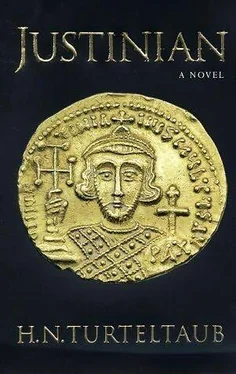Harry Turtledove - Justinian
Здесь есть возможность читать онлайн «Harry Turtledove - Justinian» весь текст электронной книги совершенно бесплатно (целиком полную версию без сокращений). В некоторых случаях можно слушать аудио, скачать через торрент в формате fb2 и присутствует краткое содержание. Жанр: Историческая проза, на английском языке. Описание произведения, (предисловие) а так же отзывы посетителей доступны на портале библиотеки ЛибКат.
- Название:Justinian
- Автор:
- Жанр:
- Год:неизвестен
- ISBN:нет данных
- Рейтинг книги:3 / 5. Голосов: 1
-
Избранное:Добавить в избранное
- Отзывы:
-
Ваша оценка:
- 60
- 1
- 2
- 3
- 4
- 5
Justinian: краткое содержание, описание и аннотация
Предлагаем к чтению аннотацию, описание, краткое содержание или предисловие (зависит от того, что написал сам автор книги «Justinian»). Если вы не нашли необходимую информацию о книге — напишите в комментариях, мы постараемся отыскать её.
Justinian — читать онлайн бесплатно полную книгу (весь текст) целиком
Ниже представлен текст книги, разбитый по страницам. Система сохранения места последней прочитанной страницы, позволяет с удобством читать онлайн бесплатно книгу «Justinian», без необходимости каждый раз заново искать на чём Вы остановились. Поставьте закладку, и сможете в любой момент перейти на страницу, на которой закончили чтение.
Интервал:
Закладка:
"No," I said, though I should have said yes. "Drowning the wretch is too quick to suit me. I want him to have plenty of time to think about his crimes and his stupidity. We'll take him back to the city, we'll throw him into a prison, and then- we'll forget about him."
"Emperor, your father never would have done such a thing," Leontios said while the excubitores, resenting him no less than the Sklavenoi for the defeat near Sebastopolis, howled laughter to see and hear him discomfited.
He had tried before to use the memory of my father to get me to do what he wanted rather than what I wanted. Having failed then, he merely proved his own foolishness by making the attempt a second time. "You're right," I told him, remembering what had happened to my uncles Herakleios and Tiberius. "My father would have cut off your nose and slit your tongue, or perhaps put out your eyes, before disposing of you for good. You may thank me for my mercy." The excubitores laughed louder yet. Leontios said nothing. I signaled to one of the guardsmen. He seized Leontios by the hair and smashed his face against the planking of the deck. "You may thank me for my mercy," I repeated.
"Thank you for your mercy," Leontios choked out through cut and bleeding lips. His nose also bled. I made up my mind to reward the excubitor for serving me well.
Constantinople neared, perhaps more rapidly than I might have liked. The simplicity of campaigning appealed to me. Now, the Emperor of the Romans is God's deputy on earth. That which is pleasing to the Emperor has the force of law. Basic tenets of Roman law, aye. But practice and law, here as in many instances, were not identical.
For one thing, I was coming home to my mother, who would pester me to marry again, which I did not want to do (an error, I see now, but I failed to see it then), and to show friendliness toward my daughter, which I wanted even less to do. For another, I was imperfectly enamored of the mass of administrative detail through which I would have to wade on returning to the imperial city. And, for a third, on campaign I did not suffer the constant scrutiny I had to endure at the palace.
The closer I got to Constantinople, the better I understood why my grandfather had abandoned it for the barbarous west. True, Lombards and the Arabs were troublesome there, but I grew ever more certain that was not the only reason for his going. If he was not also seeking escape, I should be very surprised.
But, considering the fate that found him in Sicilian Syracuse, he must have learned- although too late- there was no escape from the dangers dogging the imperial dignity. And I\a160… I stayed in Constantinople, and my fate found me there.
Stephen the Persian looked grave. Standing beside him, Theodotos looked like a vulture bereft of carrion. Stephen said, "Emperor, the treasury would have greatly benefited had the revenues anticipated from this past summer's campaign been realized. As things are, however-"
"As things are, we're flat," Theodotos broke in, his voice a harsh croak made all the harsher by contrast with Stephen's smooth almost-contralto.
"Very well, we're flat," I said. "How do we recover from being flat?"
Stephen the Persian shrugged. His jowls, flabby like those of so many eunuchs, flopped up and down. "Most desirable would have been either the continuation of tribute from the Arabs or the acquisition of booty of comparable value. Absent those factors\a160…" He shrugged again. "I have done such things as I could to increase revenue for both the public treasury and the privy purse, but we still face a significant shortfall."
"You have been diligent; I will say that much," I replied. That was, if anything, an understatement. Since returning to the imperial city, I had found myself bombarded with petitions and complaints about Stephen's methods of collecting that which was owed to the state. Up until that time, I had not imagined the Greek language contained so many syn onyms for extortion.
Most of these petitions I rejected out of hand: what man ever pays his taxes with a glad heart? Even where there was some doubt in the matter, I supported my sakellarios, for, when the needs of the subject and those of the fisc collide, those of the subject needs must give way. If the fisc fails, the Roman Empire fails, and, if the Roman Empire fails, the subject goes down in ruin.
I recall no cases where there was not at least some doubt, enough to decide in favor of gaining the needed revenue. Even so, it was not enough.
Theodotos said, "Emperor, I know how we can bring in more gold, if you'll but say the word."
I leaned forward. "Tell me. This is what I want to hear."
With a nod to Stephen the Persian, Theodotos said, "Your sakellarios, he's a clever fellow with the numbers, but he's too kindhearted by half." I looked at the ex-monk with new respect. A great many men had accused Stephen of a great many things, but excessive generosity had not, till now, been one of them. Theodotos went on, "Oh, he's willing enough to squeeze the artisans and the merchants and such, but he's hardly touched the nobles and magnates here in the city."
"What have you to say about that?" I asked Stephen.
"There is some truth to it," the eunuch replied. "Squeezing artisans and merchants makes them grumble, but nothing more. Squeeze the nobles and magnates of Constantinople too hard, and they begin to plot against you."
"Let them plot." Theodotos made a quick chopping gesture with his right hand. "Then they end up short their eyes or their noses or their tongues- or their heads. And the property of proved traitors is forfeit to the fisc."
Both finance ministers looked my way. They could propose, but I had to decide. I nodded to Theodotos. "Let it be as you say," I told him. "The nobles and magnates will not plot against me. If it weren't for my family, there would be no Roman Empire for them to inhabit. We would have fallen to the Persians or to the followers of the false prophet many years ago. Or if I am mistaken, and some of those dogs prove base enough to turn toward treachery despite that truth\a160… if that be so, we shall use them as you suggest, Theodotos."
He and Stephen the Persian both bowed their heads. I having made the decision, they went forth and put it into effect. They were good at what they did; I would not have set them in their places had they been anything but good at what they did. From that day forth, money came into the fisc in quantities adequate to make up for the tribute the deniers of Christ were no longer paying.
But oh, how the grandees screeched to have to pay their share to the government that not only kept them safe but kept them rich! By the petitions flooding in to me, by the complaints from those nobles bold enough to beard me in person, anyone would have thought the whole of their wealth was being confiscated, not just that part necessary to preserve the whole.
Some of them, as Stephen had warned me, did worse than carp. These vicious fools I detected in good time, having a fair number of spies of all descriptions scattered about the imperial city. Some of them I ordered mutilated, following Theodotos's suggestion. Others I simply cast into prison, along with the insolent guildsmen and with Leontios. Occasionally, to show my mercy, I would release one or two. The rest simply stayed where they were. Fewer people missed them, I am certain, than they imagined would be the case.
They found company in their prison cells, too, for, men being sinful and imperfect creatures, not all found themselves able or willing to obey the canons set down by the assembled bishops of the fifth-sixth synod. Those who persisted in lewd practices or in the demonically inspired customs of the pagan past deserved punishment no less than those who sought to conceal their wealth- and what they deserved, they received. If I could make it so, Constantinople would be a moral city.
Читать дальшеИнтервал:
Закладка:
Похожие книги на «Justinian»
Представляем Вашему вниманию похожие книги на «Justinian» списком для выбора. Мы отобрали схожую по названию и смыслу литературу в надежде предоставить читателям больше вариантов отыскать новые, интересные, ещё непрочитанные произведения.
Обсуждение, отзывы о книге «Justinian» и просто собственные мнения читателей. Оставьте ваши комментарии, напишите, что Вы думаете о произведении, его смысле или главных героях. Укажите что конкретно понравилось, а что нет, и почему Вы так считаете.












